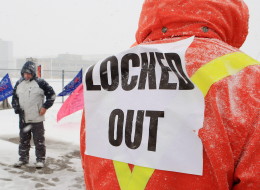Right-to-work laws in U.S. states may be putting downward pressure on Canadians’ incomes, a study from CIBC suggests.
The study comes days after the Conservative Party of Canada made right-to-work a part of its policy platform.
Declining unionization rates are likely “reducing worker bargaining power, particularly as Canadian workers now compete with ‘right to work’ states south of the border,” CIBC economists Avery Shenfeld and Emanuella Enenajor wrote. “That could reduce the wage inflation pace at any given level of unemployment.”
Right-to-work laws allow unionized employees not to pay union dues if they wish, eroding union power. Michigan earlier this year became the 24th U.S. state to enact a right-to-work law.
Evidence suggests Canadian jobs — particularly in manufacturing — have been lost to right-to-work states.
In one closely watched case, heavy machinery manufacturer Caterpillar locked employees out of its Electro-Motive plant in London, Ont., in January, 2012, after the union there rejected Caterpillar’s demand that wages be cut by more than half.
Caterpillar eventually shuttered the plant and moved the jobs there to Indiana, a right-to-work state. (A state judge recently threw the law out as unconstitutional, but that’s being appealed.)
The unionization rate in Canada fell to 29.9 per cent in January of 2012, marking the lowest percentage of Canadian workers belonging to unions since 1965, the Globe and Mail reports.
The Globe also notes that pay hikes negotiated in union agreements have been shrinking recently.
The Obama administration has been stridently opposed to right-to-work laws, with President Barack Obama saying they give you “the right to work for less.”
But in Canada, such laws came one small step closer to reality when delegates at the Conservative party convention in Calgary last weekend voted nearly unanimously to make right-to-work — among other challenges to union power — a part of its platform.
“The Conservatives, at both the federal and Ontario level, have taken a hard shift to the far right, adopting some of the most extreme U.S. Republican-style labour policies,” York University Labour Law professor David Doorey told HuffPost.
“This plays well to the Conservative base, and I suspect the government will carry through with much of the platform.”
Original Article
Source: huffingtonpost.ca
Author: Daniel Tencer
The study comes days after the Conservative Party of Canada made right-to-work a part of its policy platform.
Declining unionization rates are likely “reducing worker bargaining power, particularly as Canadian workers now compete with ‘right to work’ states south of the border,” CIBC economists Avery Shenfeld and Emanuella Enenajor wrote. “That could reduce the wage inflation pace at any given level of unemployment.”
Right-to-work laws allow unionized employees not to pay union dues if they wish, eroding union power. Michigan earlier this year became the 24th U.S. state to enact a right-to-work law.
Evidence suggests Canadian jobs — particularly in manufacturing — have been lost to right-to-work states.
In one closely watched case, heavy machinery manufacturer Caterpillar locked employees out of its Electro-Motive plant in London, Ont., in January, 2012, after the union there rejected Caterpillar’s demand that wages be cut by more than half.
Caterpillar eventually shuttered the plant and moved the jobs there to Indiana, a right-to-work state. (A state judge recently threw the law out as unconstitutional, but that’s being appealed.)
The unionization rate in Canada fell to 29.9 per cent in January of 2012, marking the lowest percentage of Canadian workers belonging to unions since 1965, the Globe and Mail reports.
The Globe also notes that pay hikes negotiated in union agreements have been shrinking recently.
The Obama administration has been stridently opposed to right-to-work laws, with President Barack Obama saying they give you “the right to work for less.”
But in Canada, such laws came one small step closer to reality when delegates at the Conservative party convention in Calgary last weekend voted nearly unanimously to make right-to-work — among other challenges to union power — a part of its platform.
“The Conservatives, at both the federal and Ontario level, have taken a hard shift to the far right, adopting some of the most extreme U.S. Republican-style labour policies,” York University Labour Law professor David Doorey told HuffPost.
“This plays well to the Conservative base, and I suspect the government will carry through with much of the platform.”
Original Article
Source: huffingtonpost.ca
Author: Daniel Tencer

No comments:
Post a Comment